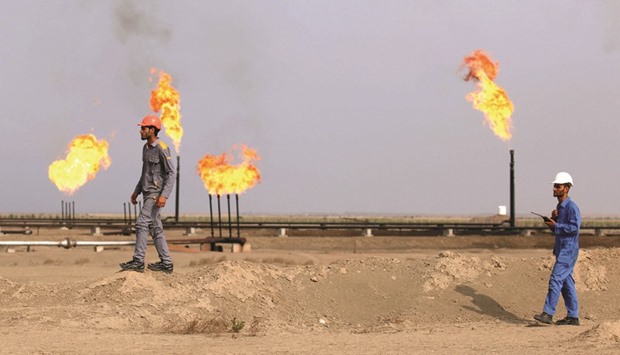Iraq’s Basrah Gas Co, owned partly by Royal Dutch Shell and Mitsubishi Corp, is pushing back its output target for natural gas by at least a year as lower oil prices constrain spending, a senior official for the joint venture said.
The company is also delaying construction of a $2bn plant to process natural gas liquids for the same reason, deputy chief executive officer Ali Salman Majeed said in a phone interview.
Basrah Gas expects Iraq to produce 2bn standard cubic feet per day of associated gas by the end of 2018 instead of 2017 as originally planned, Majeed said. The company is currently pumping 600mn standard cubic feet per day from oil fields in southern Iraq.
“We were supposed to reach the target by 2017, but because of the financial crisis, it was postponed,” he said.
Iraq, the second-biggest producer in Opec, is seeking to capture and sell the associated gas that occurs naturally with oil underground. The country currently wastes this gas by flaring it off and ranks as the world’s fourth-largest gas-flaring nation, according to Shell’s website. Basrah Gas is a project to salvage gas from some of the largest oil fields, including Rumaila, Zubair and West Qurna 1. The government wants to use the gas as fuel for power plants to boost electricity supplies and reduce outages. It also plans to import gas by pipeline from neighbouring Iran.
Iraq expects to receive about $6bn from the International Monetary Fund and the World Bank this year to shore up its public finances as it grapples with a costly war against Islamic State militants and a collapse in oil prices. Oil sales account for more than half of the nation’s gross domestic product and over 90% of fiscal and current external receipts, according to Fitch Ratings Inc. Benchmark Brent crude has dropped more than 65% from its 2014 peak.
Basrah Gas plans to increase output to 800mn by the end of this year, when Iraq’s total production, including gas pumped by state-owned South Gas Co, will reach 1bn standard cubic feet per day, Majeed said. South Gas has a 51% stake in Basra Gas, while Shell owns 44% of the venture, and Mitsubishi, 5%.
The venture’s planned NGL facility in southern Iraq is designed to produce 1bn cubic feet per day and will be built in two stages. Technip secured a contract to do front-end engineering work for the plant, he said.
Basrah Gas is planning in May to export its first shipment of liquefied petroleum gas, a household fuel comprising propane and butane, in a cargo of 2,500 metric tonnes, Majeed said. Iraq became self-sufficient in LPG in January, obviating the need to import the fuel, and it currently produces about 3,500 tonnes a day.
“We are drafting an export strategy,” he said. “God willing, we will export the first LPG shipment in May.”
The company also plans on April 1 to export 10,000 cubic meters of gas condensate, to be offloaded in the UAE port of Fujairah. Iraq is seeking to increase the average size of its condensate cargoes to 20,000 to 30,000 cubic meters per month starting in May, Majeed said.

Iraqi labourers work at an oil refinery in the southern town Nasiriyah. The country currently wastes associated gas that occurs naturally with oil underground by flaring it off and ranks as the world’s fourth-largest gas-flaring nation, according to Shell’s website.
